Suchergebnisse für "Factsheet: Energietechnologien gestalten, die für alle sinnvoll und nutzbar sind"
Speicherintegration ins Büro(Office)gebäude FutureBase (SPIN.OFF)
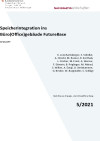
Im vorliegenden Projektvorhaben wurde in ein - in Planung befindliches - Bürogebäude ein Zink-Bromid Redox Flow Batteriespeicher integriert. Anhand dieser Demonstrationsanlage können Fragen, die bei der Integration und dem Betrieb von Batteriespeichern in gewerblichen oder öffentlichen Gebäuden auftreten, beantwortet werden.
Schriftenreihe
5/2021
K. Leonhartsberger, S. Schidler, A. Hirschl, M. Rosner, R. Korthals, L. Fischer, M. Ernst, A. Werner, F. Ettwein, B. Priglinger, M. Meisel, S. Wilker, A. Estaji, O. Stelzhammer, G. Becker, W. Burgstaller, S. Schlägl
Herausgeber: BMK
Deutsch, 139 Seiten
Downloads zur Publikation
PESI - Paradigmenwechsel im urbanen Energiesystem durch Synergiepotentiale mit der Industrie
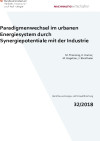
Analyse der Nutzungsmöglichkeiten industrieller Überschussenergien verschiedener Form (Abwärme, Abwasser, Abfall) sowie regenerativer Energieträger im industriellen Bereich (Solaranlagen auf Dachflächen) in angrenzenden urbanen Gebieten, die als Energieschwamm fungieren. Auf Basis realer Verbrauchs- und Verfügbarkeitsdaten wurde ein Simulationsmodell erstellt und Möglichkeiten zu Synergien dokumentiert.
Schriftenreihe
32/2018
M. Theissing, K. Karner, M. Rogetzer, J. Bärnthaler
Herausgeber: BMVIT
Deutsch, 69 Seiten
Downloads zur Publikation
TFlex - Temperaturflexibilisierung im Schwachlastbereich des Betriebs von Nahwärmenetzen
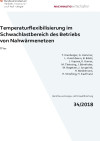
Im Zuge des Vorhabens TFlex wurde untersucht, ob sich die Netzverluste bestehender Nahwärmenetze in Schwachlastzeiten dadurch verringern lassen, indem in diesen Zeiträumen das Netz abschaltet und der Wärmebedarf der Kunden aus zuvor geladenen dezentralen Speichern bedient wird. Eine durchgängige wirtschaftliche Begleitung erlaubte es, bereits in der Projektlaufzeit technische Projekterfolge rasch in die Umsetzung zu bringen.
Schriftenreihe
34/2018
T. Kienberger, A. Hammer, L. Kriechbaum, B. Böckl, J. Vopava, K. Karner, M. Theissing, J. Bärnthaler, M. Rogetzer, J. Jungwirth, H. Biedermann, H. Strießnig, H. Kaufmann
Herausgeber: BMVIT
Deutsch, 48 Seiten
Downloads zur Publikation
OPEN HEAT GRID - Offene Wärmenetze in urbanen Hybridsystemen
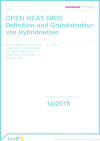
Primäres Forschungsthema von OPEN HEAT GRID war die Untersuchung der Möglichkeiten zur Forcierung der Einspeisung industrieller Abwärme in bestehende Fernwärmenetze.
Schriftenreihe
1/2018
Herausgeber: BMVIT
Deutsch
Downloads zur Publikation
Smart Energy Systems / SESWA - Award
Im Rahmen der Smart Energy Systems Week wird der "Smart Energy Systems Award“ in vier Kategorien vergeben und zeichnet neben herausragenden wissenschaftlichen Arbeiten und Forschungsprojekten auch konkrete Demonstrationsvorhaben und Start Ups aus.
Umsetzung regionaler Elektromobilitätsversorgung durch hybride Kopplung (Move2Grid)
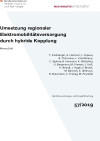
Aufbauend auf den Ergebnissen der „Stadt der Zukunft“ Sondierungsprojekte „Smart Exergy Leoben“, und „Energieschwamm Bruck“ soll im gegenständlichen,umsetzungsorientierten Forschungsvorhaben anhand des Beispiels Leoben untersucht werden, wie mit regionalen, erneuerbaren Ressourcen regionale Elektromobilität langfristig versorgt, optimal ins kommunale Verteilernetzsystem integriert und ökonomisch nachhaltig implementiert werden kann.
Schriftenreihe
57/2019
T. Kienberger, A. Hammer, J. Vopava, B. Thormann, L. Kriechbaum, C. Sejkora, R. Hermann, K. Watschka, U. Bergmann, M. Frewein, J. Koß, H. Brandl, J. Vogel, S. Moser, M. Baresch, K. de Bruyn, R. Braunstein, C. Freitag, M. Peyreder
Herausgeber: BMVIT
Deutsch, 172 Seiten
Downloads zur Publikation
LTS Flywheel - Long Term Storage-Flywheel: New approaches for increasing the economically usable storage time and safety
Development of the fundamentals for a Long Term Storage (LTS)-flywheel for decentralized storage of electrical energy (e.g. from wind or PV power plants), with a significant increase in storage time (goal: 12 hours) and safety, featuring low system costs. Therefore, the LTS-Flywheel is an essential contribution to the building of the future.
Symbiose-4-I&C - Optimal decentralized hybrid storage technologies among different energy systems -4-Industry and Commerce
The project Symbiose-4-I&C analysed the coupling of existing energy networks/-carriers, established on centralized energy network nodes or directly next to a consumer (households, industry and commerce) and the benefits of applying decentralized storage technologies. The optimal position, dimension and the right storage and conversion technology and an optimal energy wide operation of larger consumer groups were estimated for an urban model region.
StromBIZ - demonstration projects: business models for decentralized electricity generation and distribution
Feasible business models to utilize locally generated renewable energy are expected to induce a tipping point for the "Energy Turnaround" in Austria. Within the proposed project a number of demonstration PV plants on residential and non-residential buildings had been realized. On this basis new approaches of business cases had been developed, implemented, tested and disseminated.
solSPONGEhigh - High solar fraction by thermally activated components in an urban environment
Within this project the intensive use of thermally activated building elements (TABs) as an additional thermal storage in different buildings, with solar technologies (thermal, PV) preferred for energy supply, was investigated. The aim was to activate and use the thermal storage potential that is immanent in the building elements and thereby achieve solar coverage of the building's heat demand of nearly 100 %.
ÖKO-OPT-QUART - Economically optimized control and operating mode of complex energy networks of future city districts
In the project ÖKO-OPT-QUART energy-based, economic and control-orientated models will be developed in order to simulate the operating mode of complex, sustainable energy networks in city districts. For an exemplary configuration these models will be combined to an overall model which allows a realistic economic comparison of different control strategies. The final goal of the project is the development of a method for the systematic design of cost-optimized, predictive control strategies for complex energy networks in city districts.
AR-HES-B – Energy storage, production and recovery of valuable substances in wastewater treatment plants
AR-HES-B develops technologically based concepts of municipal wastewater treatment plants in order to convert them from energy consumers into a hybrid energy provider, energy storage and a provider of resources. The concept enables wastewater plants to turn into an important platform in the regional energy and mass transfer.
OPEN HEAT GRID - Open Heat Grids in urban hybrid systems
The primary research topic of OPEN HEAT GRID was to investigate the possibilities of enforcing the feed-in of industrial waste heat into existing district heating networks. The project results show that excess heat is not for free: despite minimal variable costs, the investment costs need to satisfy usual payback periods. The analysis shows that there is no need for a regulation in the sense of a feed-in obligation or market liberalization. However, from an economic point of view, information asymmetries exist, which may lead to irrational decisions.
ecoRegeneration: Development of a "Merit-Order" in order to assess regeneration heat for geothermal probes within urban residential neighbourhoods
In urban residential areas there are not enough active-cooled usages, to use the waste heat of the cooling process as required regeneration heat for geothermal probes; free cooling of the apartments is not sufficient. The project is developing various options (waste heat from commercial uses in the ground floor zones of residential buildings, by using waste heat of data centres, additional installation of heat generation systems for regeneration) within the urban settlement area, business models and is calculating life-cycle-costs of all solutions. The result should be a kind of "merit order" for regeneration heat.
Move2Grid – Implementation of regional energy-supply-concepts by hybrid coupling
Based on the results of the national-funded exploratory projects called “Smart Exergy Leoben”, and “Energy Sponge Bruck”, the present implementation project aims at analysing how local, renewable resources support the supply of electric mobility in Leoben in the long term and to integrate it into the municipal distribution grid in a good economic sense.
urban pv+geotherm - Innovative concepts for the supply of large volume buildings/ quarters with PV and geothermal energy
The use of renewable energies in inner city locations is mostly linked to higher costs andconsidered as problematic. The aim of this project was to optimize (cost and energy) heating (and where required, cooling) using geothermic and photovoltaic for an urban, densely-built development area. With the project´s findings it will be easier to ecologically and economically plan the use of renewable energies especially in urban areas.
Using buildings as energy storage - Monitoring project: Detached house H and detached house F Energy source wind power – Energy source solar power
Monitoring and comparison of performance of thermally activated building components in two similarly built, inhabited detached houses with different energy sources (wind and solar power). The functionality of energy supply through wind power or solar energy will be investigated as well as the verification of the practicability of self-regulating system control due to building temperature behaviour. The results provide an insight into the calculation assumptions, system control and feasibility of the smart grid technology.
Manage_GeoCity - Development of a method for the coordinated management of geothermal energy in urban areas
Based on the urban region Graz a method had been developed for the coordinated use and management of shallow geothermal energy for heating and cooling as well as seasonal heat storage in urban regions. Ground water flow, different geologic conditions, heating and cooling demand, heat input from solar collectors and industrial waste heat and the possibilities of seasonal heat storage in the subsurface were considered.
REC-Businesspark - Investigation of the first Austrian renewable energy community business and industrial park
In the course of the project, the conceptual design of a zero-emission or plus-energy business park in Weiz with a focus on photovoltaics and fuel cells in combination with a Renewable Energy Community (E-EGe) had been carried out. By establishing the park on a "greenfield", all structures can be created according to the requirements of the E-EGe.
TFlex - Temperature-flexibilisation in low-load operation of local district heating systems
Within the research project TFlex it was checked if the losses adherent to small district heating networks during low-load periods can be reduced. One possible solution is by deactivating the network and supplying the customers from previously charged decentralized storages. The optimal clustering of the storages and the possibility of solar-charging the storage were calculated with the aim of a guaranteed one-hundred percent heat supply.
